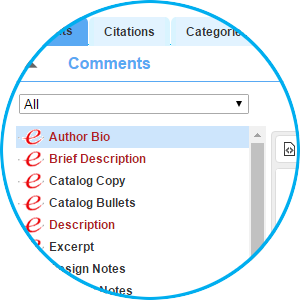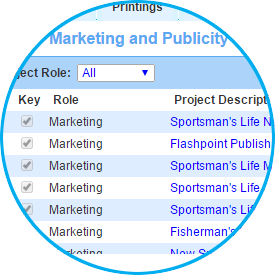Put books in readers’ hands through better discoverability
Ask any publisher what their biggest challenges are today, and discoverability will appear at the top of the list. With somewhere between 600,000 and 1,000,000 books published in the U.S. every year, getting any book noticed and into the hands of readers can be hard to do.
Overcoming this challenge requires a full-court press from every department with strategies designed to tackle the problem head-on. Here are a few of the discoverability strategies that publishers often take and how we at Firebrand can help.
 1. Consistent, thorough metadata management. The quality and completeness of your book’s metadata affects its discoverability more than any other factor. Publishers need to create high-quality metadata from the beginning and proactively engage that metadata throughout the life of the book. Neilsen released a very telling whitepaper on this topic that should be required reading for anyone in publishing.
1. Consistent, thorough metadata management. The quality and completeness of your book’s metadata affects its discoverability more than any other factor. Publishers need to create high-quality metadata from the beginning and proactively engage that metadata throughout the life of the book. Neilsen released a very telling whitepaper on this topic that should be required reading for anyone in publishing.
Our Title Management application includes numerous features and functions that make it easier to manage metadata. Everyone in your organization is able to see and interact with the most up-to-date information about your books in real time. Title Management is set up by default to track all of the metadata you need, both internally and externally, and can be easily expanded to add more information that is specific to your team and your own processes. Built-in metadata validation ensures that you don’t send out metadata that is incomplete. Our training can assist your team in understanding how to create better metadata every day.
 2. Regular updates to your metadata. Your metadata is evergreen. It is important that you not let it get old and dusty just because the book was published last year. Simon and Schuster experienced the impact of updated metadata in a pretty powerful way. S&S published a novel in 2010 called Galveston. It was written by Nic Pizzolatto, who later became the creator of the hit HBO TV series True Detectives. Galveston got good reviews and won an Edgar award when it was released, but it only sold about 1,000 copies. While there is no connection between the novel and the TV show beyond the authorship, S&S saw the rising popularity of the show and knew that it needed to take advantage of that popularity. So, the company went into the title record in Title Management and added a note in the author bio that Galveston was written by the True Detectives creator. In 2014, the novel sold more than 37,000 copies, print and e-books combined.
2. Regular updates to your metadata. Your metadata is evergreen. It is important that you not let it get old and dusty just because the book was published last year. Simon and Schuster experienced the impact of updated metadata in a pretty powerful way. S&S published a novel in 2010 called Galveston. It was written by Nic Pizzolatto, who later became the creator of the hit HBO TV series True Detectives. Galveston got good reviews and won an Edgar award when it was released, but it only sold about 1,000 copies. While there is no connection between the novel and the TV show beyond the authorship, S&S saw the rising popularity of the show and knew that it needed to take advantage of that popularity. So, the company went into the title record in Title Management and added a note in the author bio that Galveston was written by the True Detectives creator. In 2014, the novel sold more than 37,000 copies, print and e-books combined.
Obviously not every book is written by someone as well known as Nic Pizzolatto, so your mileage may vary; however, the importance of keeping your metadata up-to-date cannot be over emphasized.
 3. Engage influencers. The number of books being published each year can be quite overwhelming to readers. How do they choose what to read next? By and large, recommendations hold more sway over reading choices than any other variable. Those recommendations may come from friends and family, or from people they follow on social media, or from Goodreads, or even from their local library or bookstore owner. As a publisher, you want to get your books into the hands of these influential people and encourage them to review your book, talk to their friends and followers about it, and more. NetGalley helps you do that. NetGalley, a member of the Firebrand family, provides advance reader copies (ARCs or galleys) of your books in digital form to professional readers of all kinds. You can limit who gets access, or you can open it up to anyone. You can encourage this community of influencers to read and review your books, and reference their reviews in your marketing. NetGalley has a full suite of tools and resources available to its publishers, and is a valuable resource in the quest for greater discoverability.
3. Engage influencers. The number of books being published each year can be quite overwhelming to readers. How do they choose what to read next? By and large, recommendations hold more sway over reading choices than any other variable. Those recommendations may come from friends and family, or from people they follow on social media, or from Goodreads, or even from their local library or bookstore owner. As a publisher, you want to get your books into the hands of these influential people and encourage them to review your book, talk to their friends and followers about it, and more. NetGalley helps you do that. NetGalley, a member of the Firebrand family, provides advance reader copies (ARCs or galleys) of your books in digital form to professional readers of all kinds. You can limit who gets access, or you can open it up to anyone. You can encourage this community of influencers to read and review your books, and reference their reviews in your marketing. NetGalley has a full suite of tools and resources available to its publishers, and is a valuable resource in the quest for greater discoverability.
4. Broaden your visibility. While many publishers make the majority of their sales through just one large online retailer, a big part of discoverability is making your books available in more places. As you work out agreements with new trading partners to list, recommend, and sell your books, you need to get those partners your metadata and set up a way for them to receive the most up-to-date information when you make changes. Our Eloquence on Demand service sends metadata to more than 430 print, ebook, and audiobook partners around the world, and we already know all of their special formats, requirements, and quirks. This means that once you have that new agreement signed, you won’t get bogged down waiting for your metadata to be formatted the right way and delivered.
 5. Manage your marketing plans better. Every book you publish should have some sort of marketing plan. Whether that’s social media, digital galleys, advanced information sheets, or a combination of things, you need tools to help you make your marketing a success. Title Management has numerous functions to assist in that work, including marketing campaign project planning and tracking, event planning, customizable advanced information sheet templates, and more. Also, because these all tie into your master metadata, you can be sure that the information you create and the details you track are all up-to-date and correct.
5. Manage your marketing plans better. Every book you publish should have some sort of marketing plan. Whether that’s social media, digital galleys, advanced information sheets, or a combination of things, you need tools to help you make your marketing a success. Title Management has numerous functions to assist in that work, including marketing campaign project planning and tracking, event planning, customizable advanced information sheet templates, and more. Also, because these all tie into your master metadata, you can be sure that the information you create and the details you track are all up-to-date and correct.
Are you interested in learning more about how we can help you increase your discoverability? Contact us today to find out more!
